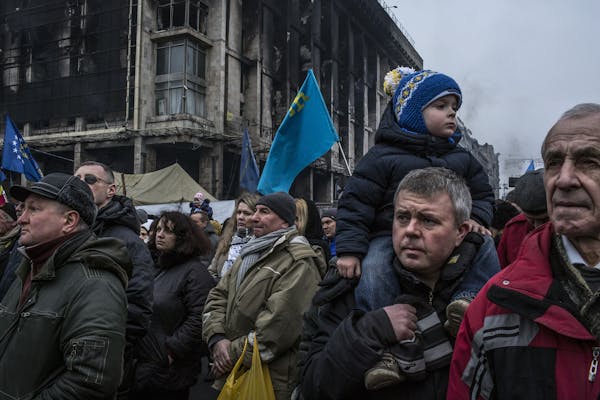"The crisis in Ukraine" is really two closely linked political events. First, a popular wave of political discontent brought down President Viktor Yanukovych. This event has been explained to Western audiences as Ukrainians choosing Western influence over closer ties to Russia. Factually, this is correct. However, it fails to explain what brought Ukrainians to the streets of Kiev and other cities. Middle-class professionals, blue-collar workers, students and retirees do not form ranks of street fighters armed with Molotov cocktails because of broad foreign-policy directions.
The demonstrations reflected the appalling state of governance in Ukraine. The Yanukovych government was a kleptocracy. Policy goals were subordinate to the enrichment of the president and a privileged elite, known colloquially as "the family." In international rankings of corruption, Ukraine was recognized as one of the most corrupt regimes on Earth.
At the top, corruption allowed Yanukovych to build a fortune (and his dreadful house). "The family" did not want cleaner government; it was, after all, contrary to personal goals. Yanukovych deflected calls for reform by politicizing the linguistic divide in the country. He claimed to be the champion of forgotten Russian speakers in the East and South. He claimed Ukraine had an option besides reform — emulation of Vladimir Putin's Russia.
However, as many political observers have observed, Yanukovych is no Putin. President Putin presides over a Russian state that also suffers from corruption, but it is an authoritarian system capable of pursuing larger policy goals, too. Yanukovych did not have larger goals, nor was he willing to "tighten the thumbscrews" to the same extent as the former KGB officer to his east. This brings us to the second event that is now unfolding in Ukraine.
After the collapse of the Soviet Union in 1991, subsequent Russian governments recognized the borders of the successor states. In the case of Ukraine, this includes a 1994 treaty known as the Budapest Memorandum of Security Assurances. Russian administrations prioritized the advancement of Russia's economic interests in these newly independent states. The policy consensus was that Russia's economy would be the dominant engine of growth in the former Soviet sphere. Although economic and trade policy became more complicated than many Russian officials assumed in the early 1990s, the idea of exerting more direct political control over former Soviet republics was dismissed as unrealistic or a dangerous form of Soviet nostalgia. Putin's initial administrations from 2000 to 2008 endorsed this policy.
This consensus ended with Russia's military incursion into the Republic of Georgia in 2008. Observers argue that Putin wanted to shift this policy earlier but did not feel he had the economy, security and legitimacy to cover the potential political cost until 2008. Others argue he needed a new crisis to stay in power after 2008. Whatever the origin, Putin abandoned Russia's economy as the sole source of influence in the former Soviet space. Instead, he has begun to re-establish political control over Russia's neighbors. What form this control will take, which Soviet republics are included and the lengths Putin is willing to go to accomplish it are uncertain.
Putin is routinely described as a good tactician but poor strategist; his long-term goals are often overshadowed by opportunistic, short-term gains. He spent more than $50 billion on the Sochi Olympics to showcase his country and improve its international standing. One week later, that effort is overshadowed by his actions in the Crimea.
International reporting has conflated these events. The first was Ukrainian. The second is an attempt by an authoritarian government to exploit a neighbor's instability and grab territory. What Putin hopes to achieve by acquiring Crimea is unclear, not only to us, but to him as well. He is most certainly aware of the international costs of military action in Ukraine — sanctions, frozen bank accounts, dismissal from global economic collaboration.
The acquisition of the Crimea under the guise of security for the Black Sea fleet based there is a slick calculation. If he goes no further, will the international community just watch and bluster? Can he expand this gambit to eastern areas of Ukraine? It is a tactical move in his larger policy of increasing Russia's direct political influence over its neighbors.
Jason Royce Lindsey is an associate professor and chair of the political science department at St. Cloud State University. In 2013, he spent six months in Ukraine on a research fellowship.
How 'the Squad' and like-minded progressives have changed their party
Protect kids online


